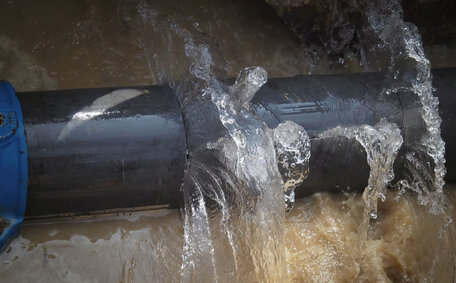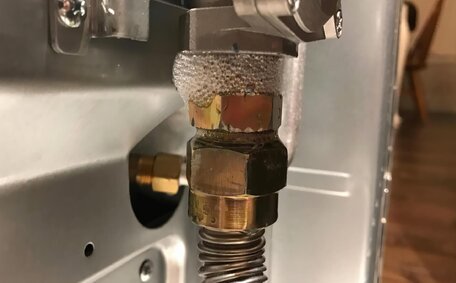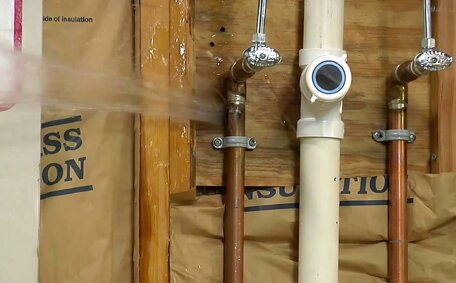Have Your Plumbing System Professionally Inspected
Having your plumbing system regularly inspected by a professional plumber is one of the best ways to prevent plumbing emergencies. During a professional inspection, a licenced plumber will thoroughly examine all aspects of your plumbing, including supply lines, drains, vents, fixtures, and more. They can detect issues before they escalate into major problems.
One key benefit is the early identification of clogged drains, which are often caused by hair and soap buildup over time. One key benefit is the early identification of clogged drains, which are often caused by hair and soap buildup over time.
A plumber can clear any current clogs and recommend maintenance to prevent future blockages.
A professional inspection allows the plumber to assess the condition of your water heater, valves, and supply lines. Old pipes and fixtures nearing the end of their lifespan can also be identified and replaced preemptively.
They can alert you to signs of wear and troubleshoot problems before you experience a disruption to your hot water supply.
Regular professional inspections along with ongoing plumbing maintenance helps ensure your plumbing continues working properly and safely. Catching issues early protects you from the hassle and costs of emergency plumbing repairs down the road. Contact a qualified plumber to have your plumbing inspected at least once per year.
Avoid Pouring Fats, Oils and Grease Down the Drain
Pouring fats, oils, and grease down the kitchen sink drain can lead to major plumbing problems. As these substances cool and congeal, they stick to the insides of pipes, causing buildup over time. This buildup eventually blocks water flow, leading to clogged drains.
Clogged drains are a common reason for emergency plumbing calls. Trying to force water through a fully blocked pipe can cause water to back up and flood your home. Clearing a grease-clogged drain requires snaking the pipe, a messy and costly repair.
Prevent clogged drains by avoiding pouring fats, oils, and grease down any drain. Allow cooked oils, grease, bacon fat, and other fats to fully cool and solidify. Allow cooked oils, grease, bacon fat, and other fats to fully cool and solidify.
This simple step protects your pipes and prevents plumbing emergencies.
Install Strainers in Sinks and Tubs
Installing strainers in all sinks and tubs provides an easy way to prevent debris from entering your drains and causing potential clogs. Strainers act as a first line of defence, catching hair, food scraps, and other particles before they can make their way into the pipes.
For sinks, basket strainers attach to the sink drain opening just below the sink. As water drains, it passes through the strainer basket, trapping solids inside while allowing water to flow through. Similarly, tub strainers attach to a tub’s drain opening, filtering out hair and other debris.
Over time, strainers collect all sorts of gunk that would otherwise wind up in your drains. Regularly removing and cleaning strainers prevents buildup. You’ll avoid pulling globs of hair and sludge out of clogged drains.
By stopping debris before it enters the pipes, strainers help keep drains free-flowing. Fewer clogs and blockages means fewer plumbing emergencies. Your drains and your water will keep flowing smoothly.
Strainers are inexpensive plumbing additions that provide major returns in preventing headaches. Install basket and tub strainers in every sink and tub throughout your home for clean, debris-free drains.
Only Flush Toilet Paper Down The Toilet
You should only flush toilet paper down the toilet. Flushing other items can lead to clogged drains and plumbing emergencies.
Many people make the mistake of flushing other things labelled "flushable", like baby wipes, cleaning wipes, or paper towels. However, these items do not break down the same way toilet paper does. They can get caught in pipes, accumulate, and cause blockages.
Clogged drains can quickly back up sewage into your home, resulting in an awful mess and potential for illness. Trying to unclog a drain blocked by wipes or paper towels yourself with a plunger usually doesn’t work and requires calling a plumber.
The plumber will have to manually retrieve the wipes/paper towels from the pipes. This requires snaking the drains with augers, high-pressure jetting, or completely removing sections of pipe. Not only is this a dirty job, but it can cost hundreds or even thousands of dollars in emergency plumbing fees.
Save yourself the headache and only flush toilet paper. Put all other items, even those labelled "flushable", in the trash can instead. Following this simple rule will keep your drains clear and prevent plumbing disasters.
Use Garbage Disposals Cautiously
Garbage disposals can be convenient for grinding up food scraps, but improper use can lead to plumbing emergencies. Use your garbage disposal judiciously to avoid problems.
Stuffing too much food waste into the disposal at once, or putting in materials that don’t grind well like egg shells, bones, or fibrous foods can cause jams. Forcing the disposal to try to grind unsuitable items can burn out the motor or damage blades.
A jammed disposal quickly leads to a clogged drain as ground up debris accumulates. Never stick your hand in a jammed disposal in attempt to clear it! If that doesn’t get your disposal working again, call a plumber to properly and safely unclog it.
This can result in serious injury. Instead, use the reset button or power switch.
To avoid jams, make sure to run plenty of cold water when using the disposal to flush food particles down. Avoid putting starchy foods like rice or pasta down the disposal which can swell up and stick, and don’t pour in grease which will solidify in pipes.
Introduce food slowly into the disposal instead of dumping everything in at once.
Take simple precautions when using your garbage disposal like running water during use, limiting starchy foods, and avoiding stuffing too much in at once. This will help your disposal operate smoothly for years and prevent plumbing emergencies caused by jams and clogs.
Don’t Flush Wipes or Paper Towels
You should never flush wipes, paper towels, or other non-toilet paper items down the toilet. Though some wipes are marketed as “flushable,” they do not break down the same way toilet paper does.
Flushing things like baby wipes, disinfecting wipes, paper towels, and feminine hygiene products can lead to serious plumbing issues. These materials get caught in pipes and cause clogs and blockages.
Trying to plunge out a clog caused by flushed wipes or paper towels rarely works. The only way to clear such a clog is to manually retrieve the wipes/paper from the pipes. This requires snaking drains or removing sections of piping entirely.
Not only is this a difficult process, but it also incurs emergency plumber fees of hundreds or thousands of dollars. Save yourself the hassle and avoid flushing anything other than toilet paper. Dispose of wipes, paper towels, and other items in the trash can instead.
Replace Old Pipes
Replacing old pipes on schedule can prevent plumbing emergencies. Over time, pipes corrode and weaken from regular use and exposure to water. Old metal pipes like galvanised steel or iron tend to rust and flake, leading to leaks, blockages, and flow issues.
Also, ageing pipes made from older plastics can crack or warp. This causes joints to separate and creates openings for leaks. Issues with old pipes only get worse over time, leading to major problems like sudden ruptures or bursts.
Having your plumbing inspected regularly enables identifying older pipes nearing the end of their lifespan. A professional plumber can advise you on when to replace pipes to get ahead of emergencies. They can also handle replacement projects for you.
One key area to be mindful of is replacing old rubber washing machine hoses that can become brittle and burst from pressure over years of use. Take proactive steps to update your plumbing and avoid the damages of leaks, floods, and costly repairs down the road.
Know the Location of Your Home’s Water Shutoff Valve
Knowing the location of your main water shutoff valve is a crucial part of preventing plumbing emergencies. This valve allows you to turn off the water to your entire home with the flip of a single switch when needed.
Having to hunt around for the shutoff in an emergency wastes precious time and can result in extensive water damage. Getting the water turned off quickly can stop leaks and prevent flooding from spreading.
Make it a priority to locate your home’s main shutoff valve and ensure all household members know where it is. Also make sure the valve is fully functional and can shut off water immediately in an emergency.
The shutoff is typically located where the main water line enters your home, often in the basement, crawlspace, garage, or an exterior wall. Trace your home’s incoming pipe to find the valve.
Taking a few minutes to identify the water shutoff location now saves major headaches if plumbing issues ever arise. You’ll be able to take quick action to protect your home from water damage and minimise any repairs needed.
Keep Drains Clear
Keeping drains clear is essential to avoid plumbing emergencies. With regular usage, sediment, hair, and other debris can accumulate inside drains and cause clogging.
Simple preventative measures include using drain covers and screens to catch debris before it enters the pipes. These covers are available for sink, tub, and floor drains. Clean accumulated debris from drain covers regularly.
You can also periodically flush drains with hot water to clear away grease buildup. Pour a pot of boiling water down infrequently used bathroom or kitchen sink drains once a month.
Use a drain maintenance product monthly to control odour and keep drains clear. Look for an enzyme or bacteria-based product that is safe for septic systems if applicable. Avoid harsh chemical drain cleaners which can damage pipes.
Watch for slowed drainage, gurgling noises, or standing water which indicate a partial clog. Have a professional plumber inspect and clear drains if you experience these issues. Catching problems early prevents complete blockages.
By taking proactive steps to keep drains free of debris, grease, and sediment, you can avoid emergency plumbing calls and keep water smoothly flowing through your home’s pipes.
Conclusion
Preventing plumbing emergencies requires diligence and proactive maintenance. Knowing where your main water shutoff valve is located is also crucial in an emergency.
By having your plumbing system regularly inspected, avoiding pouring fats down drains, installing drain screens, and only flushing toilet paper, you can avoid many issues. Also make sure to use your garbage disposal cautiously, update old pipes, and keep drains clear of debris buildup.
Taking measures to maintain your plumbing and use fixtures properly will help prevent problems and keep your home’s water flowing smoothly. For professional plumbing expertise you can rely on, contact Randwick Plumbing. Our licenced, experienced plumbers provide prompt service for plumbing installation, maintenance, and repairs throughout Randwick, Sydney.






